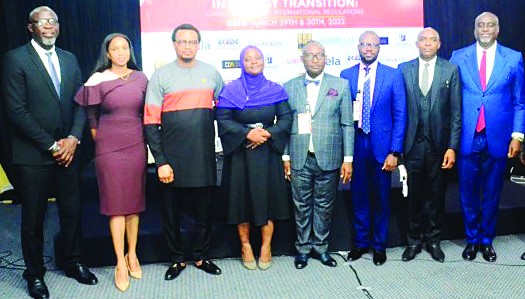Executive President, African Energy Chamber, West African Region, Abdur Rasheed Tunde Omidiya (left); Associate, Templars Energy and Projects Team, Clare Ohiro; Technical Adviser on Gas Business to the Honorable Minister of State for Petroleum Resources, Justice Derefaka; Executive Secretary, Lawyers in Energy Network, Raqeebah Oloko; Andzenge Terhrmen; ENR Advisory, Pacer Guobadia; Chairman, NBA Abuja Branch, Moses Ebute (SAN) and Chairman, Welfare Committee of the NBA, Y C Maikyau (SAN).
Participants at the Lawyers International Conference and Award 2022 have stressed the need for proper policy reforms for the efficient energy transition in Nigeria.
With the theme: ‘Africa Future Markets in Energy Transition: Laws, Policies and International Regulations’, they also argued that there could be no energy reform without economic reforms. The experts at the conference organised by Lawyers in Energy Network emphasised that Africa with its huge reserve of untapped resources would be greatly affected if left unguided by the ongoing global energy transition.
A guest speaker at the conference and chairman of Africa Energy Chamber, N. J. Ayuk, implored Nigeria to look inward to solve the country’s energy challenges as in the case of Egypt, which moved from an energy importing country to an energy-exporting country.
Represented by the Executive President, West Africa region of the African Energy Chambers, Abdur Rasheed Tunde Omidiya, he added that finding solutions to Nigeria’s energy challenges could only be achieved with a policy reform that would encourage more investors.
He said: “The policy in Nigeria today has to change to attract investors and look at investing more into transmission companies. Nigeria’s policy has to attract foreign investment. Egypt has systematically structured their system in such a way that it attracts foreign investments.
“Nigeria has to learn the framework in Egypt and bring it back home. Without this investment, we would continue in circles. “
At a panel discussion, the panellists all called for improved legal and infrastructure capacity in the country’s energy sector to support the energy transition quest before contemplating a transition to alternative energy.
A panelist and a lecturer at the University of Cape Town South Africa, Dr Terhemen Andzenge, emphasised the need for reforms in-laws.
According to him, the ideal practice was that laws are made to support and strengthen policy pursuit, not the reverse.
He, however, frowned at the Nigerian situation, where laws crop up for every challenge.
According to him, how consumers and investors perceive the regulatory system to protect their interests is very important.
He, therefore, called for a balanced and fair evolution and implementation of the regulatory tools to meet the expectations of both the investors and consumers to be satisfied through a regime of trade-offs and incentives.
He emphasised that regulators of the energy sectors must be Independent – financial, managerial and operational.
He urged for delineation and clarity of roles in basic law; clarity of operational rules; requisite powers and institutional endowments, predictability and certainty to be taken seriously by any investor.
In the case of Nigeria, he said, the composition of the Governing Board of the regulatory agencies has representatives of regulated entities such as Ministries and has disciplinary powers in the hands of the Executive bodies like Nigeria Communication Commission (NCC) and National Electricity Regulatory Commission (NERC) as well as laws with the nebulous clauses that demonstrate an inability to effectively discharge the duties of office.
According to him, there are no distinct provisions guaranteeing independence in the NCC and NERC laws.
Worst still, ministerial directives, he noted do not subject remuneration to the assessments of the National Salaries, Incomes and Wages Commission.
Another panelist, Ozim Obasi, Executive General Counsel, General Electric Africa cautioned that while working toward energy transition in Africa and Nigeria in particular, we must not throw away the natural resources the continent is endowed with.
He insisted that Nigeria must find a way of solving its energy challenges using what is available to it.
They all argued that there couldn’t be a successful transition to alternative energy without first of all utilising the available energy resources.
They, however, agreed that Africa’s energy potential, especially renewable energy, is enormous, yet only a fraction of it is being currently employed.
Justice Derefaka, a technical adviser on gas to the minister of state for power emphasised the need to drive the natural resources the country using a homegrown policy and reforms.
Moses Abute (SAN), Chairman, Nigerian Bar Association (NBA), Abuja branch earlier at the opening remarks stated that the treasures of gas and oil discovered by man must be properly guided with relevant policies and laws that will improve Africa’s energy markets.
Secretary-General of African Petroleum Producers’ Organisation, Dr. Umar Farouk, noted that the challenges faced by Africa as a major dependant in oil and gas, call for appropriate laws and regulations for sufficient utilisation of the energy sources.
Dr Farouk, represented by the director, Africa Petroleum Producers’ Organisation, said energy transition in Africa is faced with multifaceted challenges, which could be resolved through commitment and unity of purposes.
Executive Secretary, lawyers in Energy Network, Raqeebah Oloko, expressed hope that the essence of the conference, which was to pool legal and other resources towards transitioning of energy resources in Nigeria and Africa would be met.
According to her, the theme and resource persons for the conference were carefully selected with the aim to achieve the purpose of enhancing transitioning energy market in Nigeria.
She also expressed the group’s commitment to finding solutions to energy challenges in Nigeria.

